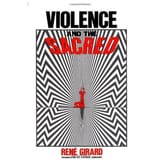Search Results
7/16/2025, 10:07:13 AM
Has anyone else read this book? It's philosophy but IMO pretty on topic for discussing ancient religions and sacred roles in them, and how that's always linked to sacrifice, ie. violence. What do you think the implications for trans being formerly sacred entities, and having morphed into what is currently the most hated group, are? I thought it had a lot of unintentionally timeless parallels to what we still talk about being trans is like here in more honest environments.
Like being "part" of the community, but only at a distance, and when that "distance" gets crossed and the sacred becomes too identical to an actual member of the community is when violence against them happens in the form of sacrifice as a scapegoat. When passoids suffer violence because of trans panics at being "gay" because of their attraction to them, when non passers suffer violence because everything wrong in society is somehow her fault. Both only happen because the othering and distance forced onto us, whether we're "accepted" as a libshits pet minority trying to access real womanhood or like a hon/troll that's wandered too far out from under their bridge, was something we sought to overcome, and in doing so became too much like an honest participant in society rather than remaining in our "sacred" class as something greater or lesser than the rest of the world. The separation is both the reason and the danger in being something considered sacred because it makes you different enough to never have to actually include.
1/2
Like being "part" of the community, but only at a distance, and when that "distance" gets crossed and the sacred becomes too identical to an actual member of the community is when violence against them happens in the form of sacrifice as a scapegoat. When passoids suffer violence because of trans panics at being "gay" because of their attraction to them, when non passers suffer violence because everything wrong in society is somehow her fault. Both only happen because the othering and distance forced onto us, whether we're "accepted" as a libshits pet minority trying to access real womanhood or like a hon/troll that's wandered too far out from under their bridge, was something we sought to overcome, and in doing so became too much like an honest participant in society rather than remaining in our "sacred" class as something greater or lesser than the rest of the world. The separation is both the reason and the danger in being something considered sacred because it makes you different enough to never have to actually include.
1/2
Page 1
